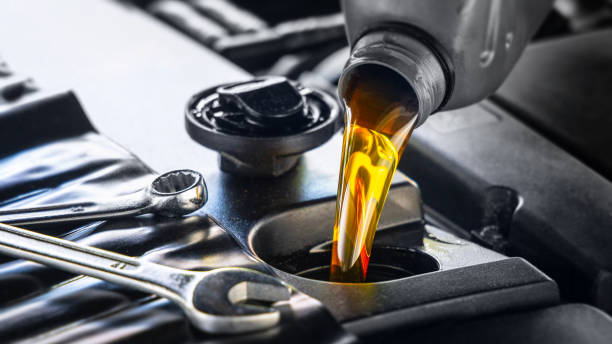How Engine Oil Works and Why It Changes Over Time
Your car’s engine oil helps the parts move smoothly and keeps the engine running well. Over time, oil can get thick or collect tiny bits from the engine. Learning about how oil works and how it changes can make understanding your car much easier and even a bit fun for anyone curious about engines.

Engine oil serves as the unsung hero in your vehicle’s mechanical symphony, performing multiple critical functions simultaneously. This golden liquid lubricates moving parts, reduces friction, transfers heat, prevents corrosion, and carries away contaminants—all while withstanding extreme operating conditions. However, these harsh conditions gradually degrade oil’s effectiveness, necessitating regular replacement to maintain optimal engine performance and longevity.
Understanding Engine Oil Composition
Modern engine oil consists of a base oil (typically mineral or synthetic) and a carefully formulated additive package. The base provides the fundamental lubricating properties, while additives enhance performance characteristics. These additives include detergents that clean engine surfaces, dispersants that prevent sludge formation, anti-wear agents that protect metal surfaces, viscosity improvers that maintain proper thickness across temperature ranges, and antioxidants that slow oil breakdown. Synthetic oils generally contain more refined base stocks and more sophisticated additive packages than conventional mineral oils, allowing them to withstand higher temperatures and maintain stability longer.
How Engine Oil Functions Inside Your Vehicle
When your engine runs, oil is pumped from the oil pan through a filter and into a network of passages and galleries. It creates a protective film between moving metal parts—like pistons, bearings, and camshafts—preventing direct metal-to-metal contact that would otherwise cause catastrophic wear. As oil circulates, it absorbs heat from hot components, particularly around the combustion chambers, and carries this heat to the oil pan where it can dissipate. Simultaneously, it captures carbon particles, metal shavings, dust, and other contaminants that enter the engine, carrying them to the oil filter. This continuous cycle happens thousands of times per minute while your engine operates.
The Aging Process of Engine Oil
Over time, engine oil undergoes several degradation processes. Oxidation occurs as oil molecules react with oxygen at high temperatures, creating acids and sludge that thicken the oil and reduce its effectiveness. Thermal breakdown happens when oil is exposed to extreme heat, causing molecular chains to break down and reducing viscosity. Contamination accumulates as the oil collects combustion byproducts, metal particles, dirt, and moisture. Additionally, additive depletion progressively reduces the oil’s protective capabilities as these chemical enhancers are consumed during normal operation. These combined processes result in oil that becomes darker, thicker, and less effective at protecting your engine.
Signs Your Engine Needs an Oil Change
Recognizing when your oil needs changing involves monitoring several indicators. The oil change light or maintenance reminder in modern vehicles offers the most straightforward signal. Visually, fresh oil appears amber and translucent, while degraded oil becomes dark brown or black and opaque. When checking the dipstick, the oil should maintain proper viscosity—if it appears gritty, excessively thick, or has a burnt smell, it’s time for a change. Unusual engine noises, particularly knocking or ticking sounds, often indicate insufficient lubrication. Performance issues like reduced fuel efficiency or sluggish acceleration can also signal that your oil is no longer functioning properly. Following manufacturer-recommended change intervals remains the most reliable approach.
Benefits of Regular Oil Change Maintenance
Consistent oil change maintenance delivers multiple advantages for your vehicle. It maximizes engine protection by ensuring moving parts remain properly lubricated, reducing wear and extending engine life. Clean oil improves fuel efficiency by reducing friction and allowing components to move more freely. It helps maintain optimal engine temperature by efficiently transferring heat away from critical areas. Regular changes prevent sludge buildup that can block oil passages and cause premature engine failure. Additionally, fresh oil with intact additives provides better protection against corrosion and oxidation. Perhaps most importantly, this simple maintenance procedure costs significantly less than the engine repairs that can result from neglect.
Types of Engine Oils and Their Applications
Selecting the right oil type depends on your vehicle specifications, driving conditions, and climate. Conventional mineral oil, derived from crude petroleum, provides basic protection at the lowest cost but requires more frequent changes. Synthetic oil offers superior performance with better temperature stability, longer service life, and enhanced protection, though at a higher price point. Semi-synthetic (or synthetic blend) oil combines properties of both types, offering a middle-ground option. High-mileage formulations contain special additives for older engines with over 75,000 miles, addressing seal conditioning and wear concerns. Oil viscosity, indicated by numbers like 5W-30, specifies how the oil flows at different temperatures—the first number shows cold-start performance, while the second indicates protection at operating temperature.
| Oil Type | Best For | Change Interval | Average Cost Per Change |
|---|---|---|---|
| Conventional | Older vehicles, light duty | 3,000-5,000 miles | $25-45 |
| Synthetic | High-performance engines, extreme conditions | 7,500-15,000 miles | $45-90 |
| Synthetic Blend | Moderate towing, varied conditions | 5,000-7,500 miles | $35-60 |
| High-Mileage | Vehicles over 75,000 miles | 5,000-7,500 miles | $40-65 |
Prices, rates, or cost estimates mentioned in this article are based on the latest available information but may change over time. Independent research is advised before making financial decisions.
Understanding engine oil’s function and degradation process illuminates why regular changes are essential maintenance rather than optional service. By maintaining fresh oil with intact additives, you provide your engine with optimal protection against wear, heat, and contaminants. This relatively simple and inexpensive maintenance procedure pays dividends through improved performance, better fuel economy, and significantly extended engine life—making regular oil changes one of the most cost-effective investments in your vehicle’s longevity.




